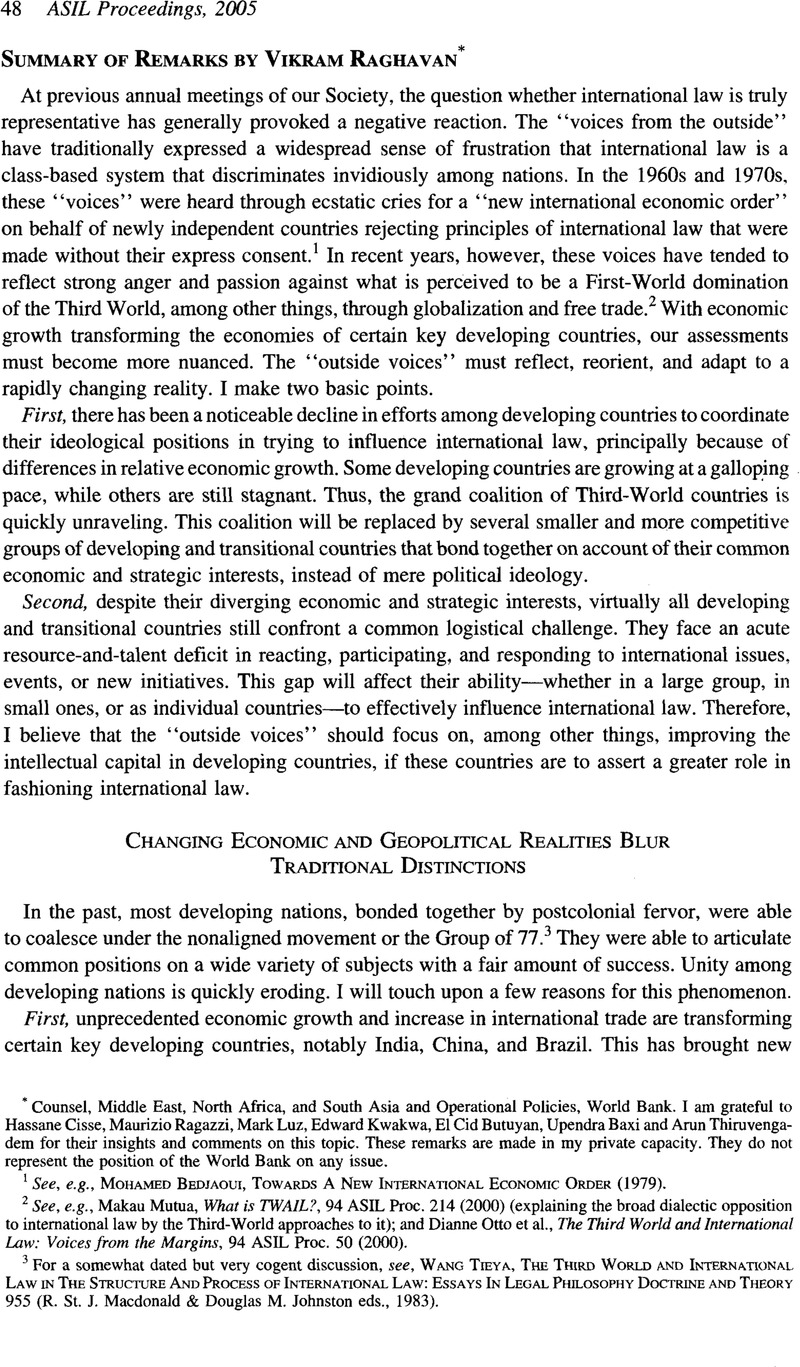No CrossRef data available.
Article contents
Summary of Remarks by Vikram Raghavan
Published online by Cambridge University Press: 28 February 2017
Abstract

- Type
- Voices from the Outside: Sovereign Equality, International Law, and the Imbalance of Power
- Information
- Copyright
- Copyright ©American Society of International Law 2005
References
1 See, e.g., Bedjaoui, Mohamed, Towards A New International Economic Order (1979).Google Scholar
2 See, e.g., Mutua, Makau, What is TWAIL?, 94 ASIL Proc. 214 (2000) (explaining the broad dialectic opposition to international law by the Third-World approaches to it); and Dianne Otto et al., The Third World and International Law: Voices from the Margins, 94 ASIL Proc. 50 (2000).Google Scholar
3 For a somewhat dated but very cogent discussion, see, Tiey, Wang , The Third World and International Law in The Structure and Process of Internation al Law : Essays In Legal Philosophy Doctrine and Theory 955 (R. St. J. Macdonald & Douglas M. Johnston eds., 1983).Google Scholar
4 See Secretary-General of the United Nations, In Larger Freedom: Towards Development, Security, and Human Rights for All, A/59/2005, 21 March 2005.
5 See, e.g., IMF-World Bank Development Committee, Voice and Participation of Developing Countries, DC2004- 0014 (29 September 2004) (discussing options to increase the role of developing and transitional countries at the World Bank responding to the 2002 Monterrey Consensus).
6 See Scott Miller & Charles Hutzler, Poor Nations Seek WTO Textile Aid; Appeal Calls for Protections from Larger Competitors Once Quotas Are Abolished, Wall Street Journal, 1 October 2004, at A.2 (noting fears expressed by poor countries in the WTO that they will be overwhelmed by textile-production superpowers, such as China and India, following removal of trade restrictions).
7 See Lamy, Pascal, The Future of Global Trade, Council on Foreign Relations Conference, 10 March 2005 (transcript available at www.cfr.org).Google Scholar
8 See Trading Blows: Some of The Issues That Pit One Group O f Developing Countries Against Another, Financial Times, 5 April 2005 at 17.
9 See Roper v. Simmons, 543 U.S. 923 (2005).
10 E-mail from P. S. Rao, Former Joint Secretary, Legal and Treaties Division, Ministry of External Affairs, Government of India.
11 See Busch, Marc L. &Reinhardt, Eric,Developing Countries and General Agreement on Tariffs and Trade/ World Trade Organization Dispute Settlement, Google Scholar 37 J. World Trade 719 (2003) (noting that in several WTO cases, poor countries did not have sufficient leverage to induce concessions from rich-country defendants; this is often because of a lack of legal, and not market power). Today, developing countries lack lawyers who can represent them in international courts and tribunals. In recent years, developing countries, especially those in Africa, have overcome their reticence and suspicion of the International Court of Justice. They have become active litigants before the World Court. But they still rely heavily on advocates from developed countries to make written and oral submissions.
12 See Waltham, Tony, US Losing Its Edge, Bangkok Post, 23 March 2005, at D2.Google Scholar
13 See Reisman, W. Michael, Lassa Oppenheim's Nine Lives, 19 Yale J. Int ‘l . L. 255, 270 (1994) (reviewing Oppenheim's 9th edition and noting that editors cite an abundance of Western European and North American treatises and journals, and not East European, Latin American, and Asian materials); Vaughan Lowe, The Marginalization of Africa 94 ASIL Proc. 231 (2000) (noting how little consideration is shown to African cases in international law reports).Google Scholar


